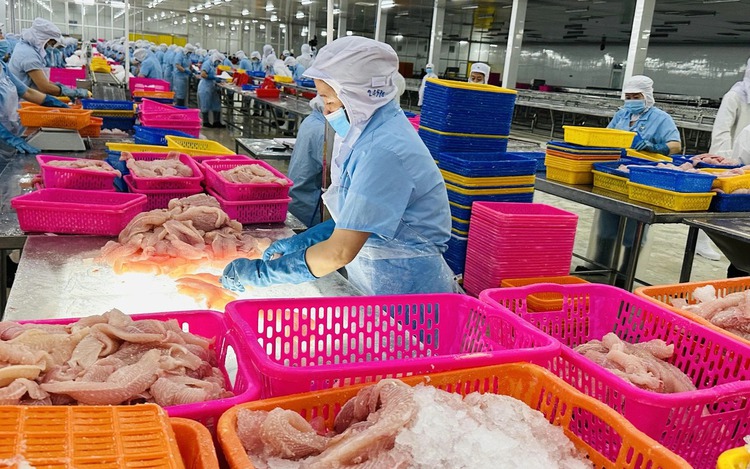
Workers process seafood bound for the U.S. at a factory in Vietnam. Photo: Thao Thuong / Tuoi Tre
The announcement was made on Sunday on the occasion of U.S. President Donald Trump and Vietnamese Prime Minister Pham Minh Chinh attending the 47th ASEAN Summit in Kuala Lumpur, Malaysia from October 26 to 28, according to the Ministry of Industry and Trade.
The framework aims to strengthen bilateral economic relations and provide exporters from both countries with unprecedented access to each other’s markets, the White House said on its website.
It also builds on the long-standing economic partnership between the two nations, including the U.S.–Vietnam Bilateral Trade Agreement signed in 2000, which took effect in 2001.
Under the framework, Vietnam has been committed to providing preferential market access for nearly all U.S. industrial and agricultural exports.
Meanwhile, the U.S. will maintain at 20 percent the reciprocal tariffs, as set forth in Executive Order 14257 of April 2, 2025, as amended, on originating goods of Vietnam, and will also identify products from the list set out in Annex III to Executive Order 14346 of September 5, 2025, Potential Tariff Adjustments for Aligned Partners, to receive a zero percent reciprocal tariff rate, according to the joint statement.
Both countries have pledged to work constructively to address non-tariff barriers affecting priority areas of bilateral trade.
Vietnam has agreed to remove or ease a range of such barriers.
In particular, the country will accept vehicles built to U.S. motor vehicle safety and emissions standards, address import licensing for U.S. medical devices, streamline regulatory procedures and approvals for U.S. pharmaceuticals, fully implement its obligations under international intellectual property treaties, and resolve U.S. concerns regarding conformity assessment procedures.
Both countries will finalize commitments on digital trade as well as trade in services and investment, while also cooperating on intellectual property, labor, environmental standards, customs and trade facilitation, regulatory best practices, and distortionary behaviors of state-owned enterprises.
The two sides have pledged to remove and prevent obstacles facing U.S. agricultural products in the Vietnamese market, particularly those related to U.S. regulatory oversight and the recognition of certificates issued by U.S. authorities.
The framework further underscores both nations’ cooperation to strengthen supply chain resilience, including joint efforts to curb duty evasion and enhance collaboration on export controls.
In addition, the statement notes recent commercial agreements between U.S. and Vietnamese companies in agriculture, aerospace, and energy.
Vietnam’s national flag carrier Vietnam Airlines has agreed to purchase 50 aircraft from Boeing in a deal valued at over US$8 billion, while Vietnamese firms have signed 20 memorandums of understanding with U.S. companies to buy American agricultural commodities worth an estimated $2.9 billion.
In the coming weeks, the U.S. and Vietnam will finalize the agreement on reciprocal, fair, and balanced trade, prepare it for signature, and complete domestic procedures necessary for it to enter into force.
This framework marks the latest step in the ongoing negotiations between the two countries over reciprocal trade and tariffs that began in late April, following the U.S. administration’s announcement of a 46-percent reciprocal tariff on Vietnamese imports earlier that month.
The measure was then delayed for 90 days to allow time for negotiations.
On August 1, the White House issued an Executive Order by U.S. President Donald Trump revising reciprocal tariff rates for 69 countries and territories listed in Annex I, including Vietnam.
The new order reduced the tariff on Vietnamese imports from 46 percent to 20 percent.


Max: 1500 characters
There are no comments yet. Be the first to comment.